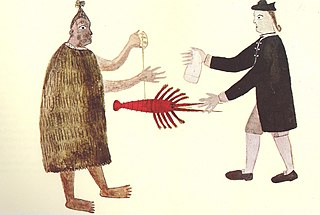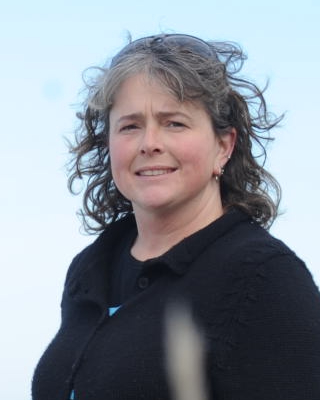Related Research Articles

The Treaty of Waitangi, sometimes referred to as Te Tiriti, is a document of central importance to the history of New Zealand, its constitution, and its national mythos. It has played a major role in the treatment of the Māori people in New Zealand by successive governments and the wider population, something that has been especially prominent from the late 20th century. The treaty document is an agreement, not a treaty as recognised in international law, and has no independent legal status, being legally effective only to the extent it is recognised in various statutes. It was first signed on 6 February 1840 by Captain William Hobson as consul for the British Crown and by Māori chiefs from the North Island of New Zealand.

Tino rangatiratanga is a Māori language term that translates literally to 'highest chieftainship' or 'unqualified chieftainship', but is also translated as "self-determination", "sovereignty" and "absolute sovereignty". The very translation of tino rangatiratanga is important to New Zealand politics, as it is used in the Māori version of the Treaty of Waitangi to express "full exclusive and undisturbed possession" over Māori-owned lands and property, but different translations have drastically different implications for the relationship between the 1840 signatories: the British Crown and the Māori chiefs (rangatira).

Waitangi Day, the national day of New Zealand, marks the anniversary of the initial signing—on 6 February 1840—of the Treaty of Waitangi. The Treaty of Waitangi was an agreement towards British sovereignty by representatives of the Crown and indigenous Māori chiefs, and so is regarded by many as the founding document of the nation.
Ewen McQueen is a New Zealand writer and social commentator who blogs at RenewNZ. From 2008 to 2018 he was involved in the National Party in the Epsom electorate. Prior to that was the leader of Christian Heritage NZ. McQueen has had opinion pieces published in newspapers around New Zealand and on the Stuff website. These include articles on family values issues, the Treaty of Waitangi, and New Zealand's Christian history.
Claims and settlements under the Treaty of Waitangi have been a significant feature of New Zealand politics since the Treaty of Waitangi Act 1975 and the Waitangi Tribunal that was established by that act to hear claims. Successive governments have increasingly provided formal legal and political opportunity for Māori to seek redress for what are seen as breaches by the Crown of guarantees set out in the Treaty of Waitangi. While it has resulted in putting to rest a number of significant longstanding grievances, the process has been subject to criticisms including those who believe that the redress is insufficient to compensate for Māori losses. The settlements are typically seen as part of a broader Māori Renaissance.

Mai Chen is a New Zealand and Harvard educated lawyer with a professional and specialist focus in constitutional and administrative law, Waitangi tribunal and courts, human rights, white collar fraud and regulatory defence, judicial review, regulatory issues, education law, and public policy and law reform. Chen is a barrister and holds an office in the Public Law Toolbox Chambers. She is an adjunct professor at the University of Auckland School of Law. Having served previously in the university's Business School. Chen is also the Chair of New Zealand Asian Leaders, SUPERdiverse WOMEN and the Superdiversity Institute for Law, Policy and Business. She is married to Dr John Sinclair and the two have one son.

Elizabeth Jane Kelsey is a New Zealand academic and activist who has promoted critical examination of the relationship between social, political and economic issues and how these can impact on human rights and justice. Specifically, within the New Zealand context, she has advocated public policy positions on colonialism and te Tiriti Waitangi, globalisation and neoliberalism, and the role of universities as public institutions. She has published widely on these and other issues, and in 2020 won the Global category of the New Zealand Women of Influence Award. Kelsey was professor of law at the University of Auckland until her retirement in 2022.
The law of New Zealand uses the English common law system, inherited from being a part of the British Empire.
Otago University Press is an academic publisher associated with the University of Otago. The press is located in Dunedin, New Zealand. The Otago University Press is the oldest academic publisher in New Zealand. The Otago University Press publishes non-fiction and poetry and is also the publisher of the literary journal Landfall.
Margaret Shirley Mutu is a Ngāti Kahu leader, author and academic from Karikari, New Zealand and works at the University of Auckland, New Zealand. She is Māori and her iwi (tribes) are Ngāti Kahu, Te Rarawa and Ngāti Whātua.
The Marsden Medal is a yearly award given by the New Zealand Association of Scientists. It is named after Sir Ernest Marsden and honours "a lifetime of outstanding service to the cause or profession of science, in recognition of service rendered to the cause or profession of science in the widest connotation of the phrase." It rivals the Rutherford Medal from the Royal Society of New Zealand.

In New Zealand law and politics, the principles of the Treaty of Waitangi is a phrase used in the Treaty of Waitangi Act 1975. It is a set of principles derived from, and interpreting, the Treaty of Waitangi. These principles were codified in 1987, partly an attempt to reconcile the different Māori and English language versions of the treaty, and allow the application of the treaty to a contemporary context.
Hallie Ruth Buckley is a New Zealand bioarchaeologist and professor at the University of Otago.

Jacinta Arianna Ruru is a New Zealand academic and the first Māori professor of law. Ruru is currently a professor at the University of Otago.
Elizabeth McLeay is a New Zealand political scientist. She is currently an Emeritus Professor at Victoria University of Wellington.

Joseph Mooney is a New Zealand politician. In 2020 he was elected as a Member of Parliament in the House of Representatives for the National Party in the Southland electorate.
Richard Stephen Hill, Emeritus Professor, is a New Zealand historian who worked as a public servant before becoming an academic. As a member of the Waitangi Tribunal he played a role in the reconciliation process between the Crown and Māori that led to the Crown’s acceptance of indigenous concepts of history as a basis for political practice, enabling Aotearoa New Zealand to emerge in the late 20th century from its 19th century colonial origins.

Nicola Rowan Wheen is a New Zealand academic, and is a full professor at the University of Otago, specialising in national and international environmental law, and environmental law and the Treaty of Waitangi.
Jen Margaret is a New Zealand Te Tiriti o Waitangi educator, researcher, and author on community and international development work. She founded Groundworks, an organisation to educate Pākehā about New Zealand history and Te Tiriti o Waitangi.
Veronica Makere Hupane Tawhai is a New Zealand academic where she is an associate professor at Massey University.
References
- ↑ "Professor Janine Hayward, Politics, University of Otago, Our people, Department of Politics, University of Otago, New Zealand". Otago.ac.nz. Retrieved 24 February 2018.
- 1 2 Gibb, John (27 March 2014). "Hayward at helm again | Otago Daily Times Online News". Odt.co.nz. Retrieved 24 February 2018.
- ↑ "Hayward, Jock, Commemorative Register, Property Services, University of Otago, New Zealand". Otago.ac.nz. 19 September 1997. Retrieved 24 February 2018.
- ↑ Hayward, Janine (1995). In Search of a Treaty Partner: Who, or What, is 'the Crown'? (Doctoral thesis). Open Access Repository Victoria University of Wellington, Victoria University of Wellington. doi: 10.26686/wgtn.16949611 .
- ↑ "Associate Professor Janine Hayward appointed full professor, News and events, Department of Politics, University of Otago, New Zealand". Otago.ac.nz. Retrieved 24 February 2018.
- ↑ "Inaugural Professorial Lecture – Professor Janine Hayward, Events, University of Otago, New Zealand". Otago.ac.nz. 6 November 2017. Retrieved 24 February 2018.
- ↑ Otago, University of. "Inaugural Professorial Lecture – Professor Janine Hayward". University of Otago. Retrieved 3 April 2019.
- ↑ Politics, Department of. "Professor Janine Hayward, Politics, University of Otago". www.otago.ac.nz. Retrieved 3 April 2019.
- ↑ Loughrey, David (19 September 2018). "Call to reform local govt voting system". Otago Daily Times Online News. Retrieved 3 April 2019.
- ↑ College, Hayward. "College Fellows". www.otago.ac.nz. Retrieved 3 April 2019.
- ↑ "Decision to stick with single transferable voting could be challenged". Stuff.co.nz. Retrieved 24 February 2018.
- ↑ "Why DCC elections are in an exclusive club | Otago Daily Times Online News". Odt.co.nz. 25 September 2013. Retrieved 24 February 2018.
- ↑ "Nightly Interview: Janine Hayward". Channel 39. 1 September 2016. Retrieved 3 April 2019.
- ↑ "Associate Professor Janine Hayward (Politics), University of Otago - New Zealand Parliament". www.parliament.nz. Retrieved 3 April 2019.
- ↑ "Janine Hayward - New Zealand Parliament". www.parliament.nz. Retrieved 3 April 2019.
- ↑ "Janine Hayward - New Zealand Parliament". www.parliament.nz. Retrieved 3 April 2019.
- ↑ "Janine Hayward - New Zealand Parliament". www.parliament.nz. Retrieved 3 April 2019.
- ↑ "Janine Hayward - New Zealand Parliament". www.parliament.nz. Retrieved 3 April 2019.